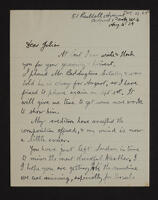On the fly-leaf are some lines of poetry partly pencilled and then inked over, partly in ink originally. On the fly-leaves at the other end are further fragments in ink and pencil, and one is headed: ‘Plan of a Poem. The Seasons. | Spring. The Visitation, &c.’ Other verses in pencil are on blank pages in the body of the volume, which consists of botanical notes, predominantly on fungi. At the other end is the date 23 Sept. 1793.
Zonder titelWallington, Cambo, Morpeth. - Thanks Elizabeth for her long letter: 'the old ladies' must have been very funny. Hopes she found Julian well. Margaret and Reggie Smith are staying on their way north; he seems sensible and is going to travel to India and so on before 'settling down at the Bank'; Margaret 'has wonderful masses of red hair' which she wears in a strange style [a sketch illustrates this]. Hopes the weather will be good so they can have a picnic; Elizabeth and Robert were not fortunate with the weather for their visit, she loved seeing them and is glad they enjoyed themselves. Likes Robert's poem very much and so does Charlie. [Charles and Mary's] children came on Sunday, with 'little Steven Runciman'; Nora [Trevelyan?] has arrived 'so the Cambo "season" has commenced'. Hears there will be about six hundred people on the 'Liberal Excursion'; hopes they have good weather. Pantlin has gone with her cousin to the seaside. Mrs [Nora] Sidgwick is visiting next week. Hopes Mr Enticknap's journey home went well; she sees Gussie at work [in the gardens] 'looking busy and happy'.
Welcombe, Stratford on Avon. - He is recovering from his illness. There has been great anxiety about Meta [Smith]'s eldest boy [Cyril], who has been 'fearfully ill at Eton with pneumonia'; Meta has been ill too, and now her husband, who has 'very delicate health' has had a dangerous attack of the same illness.
8, Grosvenor Crescent. - Found C[harles] and M[ary] settled at North Street, a 'bright little house' which they have made pretty, furnishing it 'economically' and suitably for a small space; their [wedding] presents looked nice, and they have an excellent book collection. Mary looks very contented, and 'Charlie's hair is curling as it has not done for a long time!'. One of the two small drawing-rooms has two pianos in; if they play them together their neighbours will think it noisy, but 'they are humble folk, & the children who swam in Westminster will come & listen in the street!'. George looks as if he needs a holiday; Caroline is glad the wedding is not far away, on 17 March. Janet looks very happy and says she is busy with her trousseau. Dorothy has returned and said to be 'much better for her journey'. Saw the H[enry] Y[ates] Thompsons yesterday; they start for Sicily tomorrow; Caroline will ask Mrs Cacciola [Florence Trevelyan] to let them see her garden. Asks whether Madame Grandmont [Bramine Hubrecht] would let them call on her; thinks she would like Dolly. Harry is telling people that Caroline and Sir George like their new daughters-in-law, but will not say 'either of them come up to Elizabeth in character or walking!'. Glad he has the right impression, though of course they will all have a 'separate place' in their hearts; Mary is good, sensible, and suits Charles, but 'needs a little polishing'.
If there are things at La Croix which would be suitable for a bazaar at Stratford, asks if Elizabeth could buy her two pounds worth; she can send them by post if she likes. Going today to see if they can find out about Aunt Margaret [Holland]'s health; fears it is her 'old trouble, clots'. Meta [Smith?] has reached Egypt; is said to be better. Very glad life at La Croix suits Robert's work. Caroline has found a cabinet at Stratford which she thinks will suit their new house; asks whether the work on that has begun yet.
Wallington, Cambo, Morpeth. - They have just had a 'long letter from Robert' [in the East] but have not yet read it through; expects Elizabeth will also hear from him. Julian becomes ever more talkative. Miss [Charlotte?] Moberly has been to visit. The hounds are coming this morning; does not know whether Julian will get out as it is raining, but he will be able to see them in the yard from the window. She and Sir George are 'greatly distressed' about the 'shocking row' in the House [of Commons, on Home Rule]. Charlie was here on Thursday night; he has gone today with Mary to Alnwick to speak in the place of E[dward] Grey, who cannot leave London. Their children are coming today to see the hounds, then 'sleep and dine' at Wallington. Nora [Trevelyan] came to lunch and to say goodbye as she is leaving; she looked very shaky. Meta [Smith]'s eldest son Reginald is engaged; he is 23 and does not come of age till he is 25, so Meta will not have to leave Goldings till then. Mary is quite well now.
Also some photographs of buildings and landscapes. The first photographs in the album often have elaborate labels and frames added by hand, several with watercolour illustrations of flowers.
Zonder titelMS poem in Latin signed at end "[J.] Hill, Trin: Coll, Cantab: 1702". A copy[?], not in Thomas Hill's hand.
Zonder titelLetterpress copying book, with copies of letters from Image to students and their families, as well as to other members of the College and University on tutorial business. Letter from Florence Image to the Master [G. M. Trevelyan], 4 Jun. 1948, originally accompanying the book when given to Trinity, which mentions that she has 'another volume of this date, a year or two earlier, to go through... I believe of less import in the College Annals' found loose inside front cover; this is presumably now O.11.19a.
Zonder titelMontepulciano (Prov. di Siena). - Has had news from Elsa Dallolio of I Tatti, who paid her first visit there on B.B. [Berenson]'s seventieth birthday: Mary [Berenson] dined and seemed well; his own opinion is that she is getting better but also grows intolerant of everything going 'against either her hopes or her prejudices'. Elizabeth is amazed at her fluctuations in health. However there is something 'big' in her so that those with her must 'feel the benefit of her greatness' even when sharing her life has inconveniences. B.B. was very healthy, but a month of life at I Tatti at the height of the season in Florence has tired him. Mary is due to go to Vienna soon, then B.B. and Nicky [Mariano] leave for Venice; he is tempted to join them there but put off by the heat. The music at Florence has been mixed: began with hearing [Adolf] Busch's rehearsals of the Brandenburg concerto and was very taken buy the performance, though he regretted the choice of the 'modern' piano over the clavichord despite Serkin's beautiful performance). The Weingartner performance of [Beethoven's] ninth symphony was uneven. Was sorry not to hear "Norma"; found Serafin's conducting of some other Italian vocal pieces lacking delicacy; Bruno Walter gave a good performance of [Mozart's] "Seraglio", an uneven one of Mozart's "Requiem", and a difficult Mozart concerto at Palazzo Vecchio. Saw Gluck's "Alceste" on an immense scale in the Boboli gardens. [John] Walker is here again and settled in Rome: B.B. is worried that he will be distracted by 'too many girls and women'. Hopes he will see Trevelyan at the Consuma in August, where he will go to allow Nicky to take her holiday in Sorrento. Hopes Bessie Trevelyan is doing well after her operation.
Bristol. - Did not reply to Milnes' letter from Paris as passage of Bill rendered an interview with Palmerston unnecessary; certificate for Kingswood; girls' reformatories needed; Lady Noel Byron has bought an Elizabethan house [Red Lodge] for the purpose; hopes proposed school will be self-supporting but in the meantime would be glad of funds.
Pamphlets by Whewell: Considerations on the "General principles in regard to Colleges proposed for consideration" by the Cambridge University Commissioners dated 1 Jan. 1858, and Suggestions respectfully offered to the Cambridge University Commissioners dated 18 July 1858, with a printed letter from Whewell to the Fellows dated 23 June 1858.
Has written out his thoughts for Sraffa as promised; has to lecture tomorrow but physically very low; wishes to see Sraffa before he goes down.
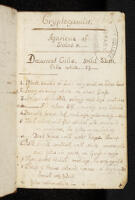
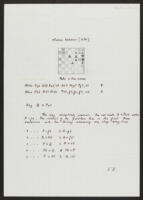
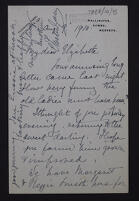

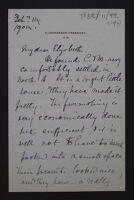
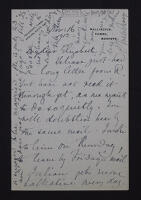

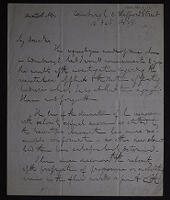
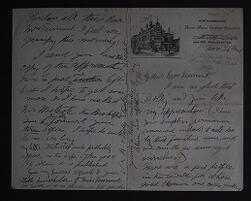
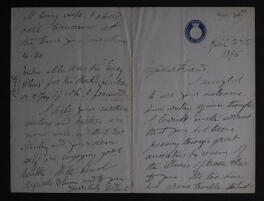
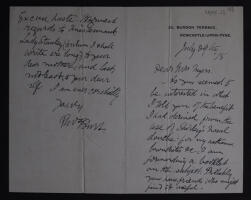
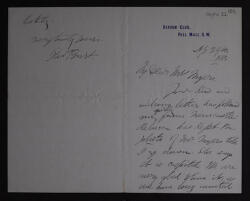
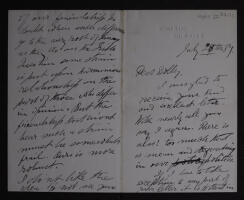
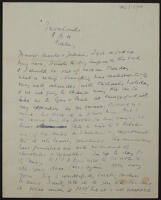
![[Thomas Hill], "Nundinae Sturbrigiensis"](/uploads/r/trinity-college-library/b/8/a/b8a589daedc4904d258e15b54d4d8d7a32f760ae16ed89983732c041c29d78c0/thumb.jpg)
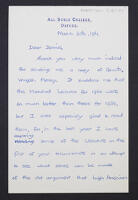
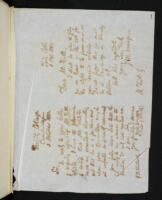
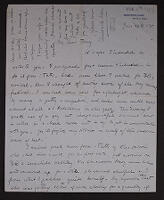

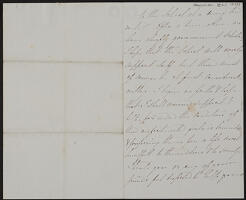
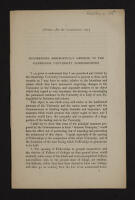
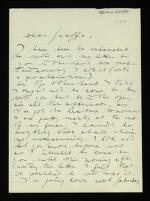
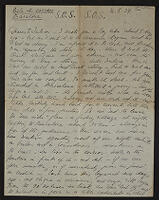
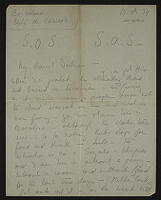
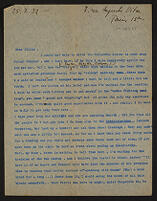
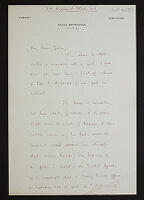
![Letter from [Bertrand] Russell to Julian Trevelyan](/uploads/r/trinity-college-library/5/8/5/5850d14792ba61f2ef6c812449562b4424b606da0b9a6b22e20ba4774e8a8cd2/TREJ.1.24_thumb.jpg)
![Letter from Adrian Stephen to Betty [Elisabeth Wiskemann]](/uploads/r/trinity-college-library/8/c/3/8c398ec62577e7925baea4a1712b50074e10f9bf95b7e80fb0262c12d9630800/TREJ.1.51_thumb.jpg)
![Letter from Naomi Mitchison to Betty [Elisabeth Wiskemann]](/uploads/r/trinity-college-library/6/c/f/6cfdaa994db41fc4c2d3d2e5b59f01561f2f5233ad2441d465dd8bd6743f66b5/TREJ.1.53_thumb.jpg)
